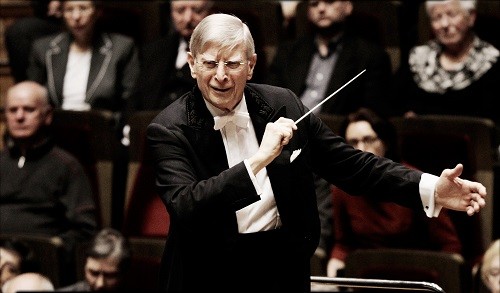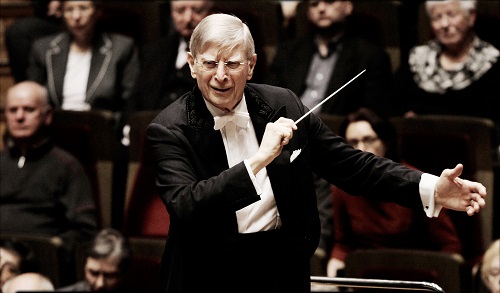 United Kingdom Brahms, Beethoven: Martin Helmchen (piano), Philharmonia Orchestra / Herbert Blomstedt (conductor), Royal Festival Hall, London, 25.5.2017. (GD)
United Kingdom Brahms, Beethoven: Martin Helmchen (piano), Philharmonia Orchestra / Herbert Blomstedt (conductor), Royal Festival Hall, London, 25.5.2017. (GD)

Brahms – Piano Concerto No.1 in D minor, Op.15
Beethoven – Symphony No. 7 in A major, Op.92
In many ways this was as fine a performance of what Donald Tovey called a, ‘classical concerto of unprecedented tragic power’, as I have heard. Blomstedt, noted as a fine Brahms conductor, seemed to get the dramatic opening orchestral balance just right. Or perhaps I should say he made the rather thick orchestration – especially in the lower orchestral registers with baleful bassoons and contra bassoons, timpani and double-basses – audible, all helped by Blomstedt’s deployment of antiphonal violins. It is incredible to think that Brahms was in his early twenties when he composed this masterpiece; his first major orchestral work. The only comparable examples of such mastery at such a young age are from Mozart, especially his early operatic masterpiece Idomeneo, and Handel in the Latin Motets he composed in his youthful days in Rome. Blomstedt managed a beautiful lucidity in the woodwinds which usher in the first plangent theme for piano soloist, which Tovey compared to one of the ‘ariosos’ from Bach’s St Matthew Passion, which Brahms, of course, knew well.
Overall Helmchen played very well, but at times I don’t think he quite had the huge pianistic range required here. There was plenty of energy and clarity in his playing but for me there was a certain lack of depth, inner intensity and lyricism, so crucial in Brahms and this work in particular. I was longing for the warm tone of say Pollini or Gilels, or in the field of younger pianists Nicholas Angelich, who is superb in Brahms. The beginning of the development section with a triumphant ff from the soloist went well, with powerful drumrolls which never obscured the piano. Also the beginning of the first movement coda with an ironic D major from the soloist had all the necessary drama. Here, and despite the shortcomings mentioned, I perceived a fine rapport, a dialogue between soloist and conductor. Blomstedt initiated a superbly sustained Adagio. All the way through this profound statement there was a measured pace which, however, never dragged. Brahms in his sketches inscribed the opening devout theme as a Benedictus, and there is a clear relationship here to the Benedictus from Beethoven’s Missa Solemnis, Also the movement is thought to be Requiem for his friend Robert Schumann. The chorale-like middle section in B minor emerged naturally from minor key tonal structure of the movement and the whole work. The entry of a solemn minor key, measured figuration for timpani, silent throughout the rest of the movement, had a trenchant effect rounding off the mood of stoic, tragic resignation in the last chords.
The last movement again was admirably paced by Blomstedt. Commentators on this concerto always emphasise the influence of the last movement of Beethoven’s C minor Piano Concerto in this movement. There are obvious similarities here, and both are rondo movements. But I don’t think these similarities should be taken too far. Brahms’s rondo is cast more in the minor key register and is more expansive than the Beethoven concerto. And both have an intricate fugal section before the coda in the orchestra, the Brahms being longer and more elaborated. Again Blomstedt brought out all the counterpoint here with admirable economy and clarity. The exultant D major coda itself, just after Helmchen’s well timed quasi cadenza, went well with its clearly audible reference to the passage ‘wo dein sanfter Flügel weilt’ from the finale of Beethoven’s Ninth Symphony.
Blomstedt conducted the Beethoven Seventh at a Prom last year with the Leipzig Gewandhaus Orchestra. The performance was virtually the same. I slightly preferred the Leipzig woodwind phrasing and intonation, but overall the Philharmonia was the equal of the great German orchestra.
Geoff Diggines
For more about the Philharmonia’s concerts click here.
